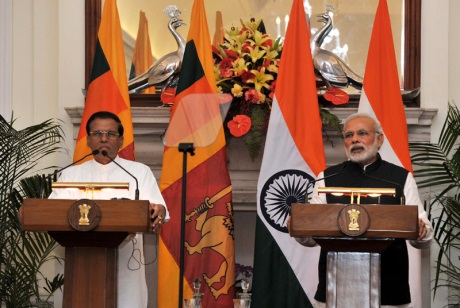India and Sri Lanka have signed an agreement to cooperate in civil nuclear energy.
 |
| Sirisena and Modi address the media today (Image: Indian prime minister's office) |
The agreement was one of four signed today during a meeting in New Delhi between Indian prime minister Narendra Modi and newly-elected Sri Lankan president Maithripala Sirisena.
The accord will facilitate cooperation in the transfer and exchange of knowledge and expertise, sharing of resources, capacity building and training of personnel in peaceful application of nuclear energy - including the use of radioisotopes - nuclear safety, radiation safety and nuclear security, the Economic Times reported.
It would also facilitate cooperation in radioactive waste management and nuclear and radiological accident mitigation and environmental protection, the Indian newspaper said.
Addressing the media during Sirisena's visit, Modi said: "The bilateral agreement on civil nuclear cooperation is yet another demonstration of our mutual trust. This is the first such agreement Sri Lanka has signed. It opens new avenues for cooperation, including in areas like agriculture and healthcare."
In September 2010, the Sri Lankan government commissioned its Atomic Energy Authority and Ceylon Electricity Board to conduct a pre-feasibility study of using nuclear energy for power generation from about 2025. It is revising its Atomic Energy Authority Act accordingly. In 2011, Sri Lanka announced that it would establish an Atomic Energy Regulatory Council to allow for the introduction of nuclear power generation technology in the country, and also to address concerns over the security of radioactive sources and to deal with radiation emergencies.
Researched and written
by World Nuclear News






_55401.png)
_23009.jpg)






